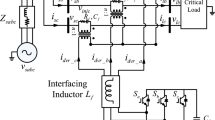Abstract
Three-phase unbalanced system can be represented mathematically in terms of positive, zero, and negative sequence components. These components are really useful to provide information regarding power quality disturbances in an unbalanced system. Thus effective estimation of sequence components using appropriate signal processing models helps to detect short-duration disturbances like sag, swell, etc. The use of fractional-order calculus-based signal processing models has given a new dimension to estimate parameters and track non-stationary power quality events. The input matrix and weight vector are generated using trigonometric expansion considering the voltages across all the three phases. The magnitude and phase of the sequence components can be estimated from the optimal weight vector which is recursively updated using the proposed algorithm. In this study, the strength of fractional-order calculus is exploited using least mean square/fourth (LMS/F) to estimate sequence components in an unbalanced three-phase power system. The proposed fractional LMS/F (FLMS/F)-based model is tested using signals generated from MATLAB 2020 and IEEE 1159 PQE database. All the comparisons of results are made using standard performance measures, and also the convergence analysis of the algorithm is presented.


















Similar content being viewed by others
References
Charles Smith J, Hensley G, Ray L (1995) IEEE recommended practice for monitoring electric power quality. In: IEEE Std, pp 1159–1995
Soliman SA, El-Hawary ME (1996) Application of Kalman filtering for online estimation of symmetrical components for power system protection. Electric Power Syst Res 38(2):113–123
Marei MI, El-Saadany EF, Salama MMA (2004) A processing unit for symmetrical components and harmonics estimation based on a new adaptive linear combiner structure. IEEE Trans Power Deliv 19(3):1245–1252
Pradhan AK, Routray A, Basak A (2005) Power system frequency estimation using least mean square technique. IEEE Trans Power Deliv 20(3):1812–1816
Das BK, Chakraborty M (2014) Sparse adaptive filtering by an adaptive convex combination of the LMS and the ZA-LMS algorithms. IEEE Trans Circuits Syst I Regul Pap 61(5):1499–1507
Bershad NJ, Wen F, So HC (2017) Comments on “fractional LMS algorithm’’. Signal Process 133:219–226
Tan Y, He Z, Tian B (2015) A novel generalization of modified LMS algorithm to fractional order. IEEE Signal Process Lett 22(9):1244–1248
Chaudhary NI, Zubair S, Aslam MS, Raja MAZ, Machado T (2019) Design of momentum fractional LMS for Hammerstein nonlinear system identification with application to electrically stimulated muscle model. Eur Phys J Plus 134(8):407
Osgouei SG, Geravanchizadeh M (2010) Speech enhancement using convex combination of fractional least-mean-squares algorithm. In: 2010 5th International symposium on telecommunications, IEEE, pp 869–872
Wang Q, Ma J, Siyuan Yu, Tan L (2020) Noise detection and image denoising based on fractional calculus. Chaos Solitons Fractals 131:109463
Jimin Yu, Tan L, Zhou S, Wang L, Siddique MA (2017) Image denoising algorithm based on entropy and adaptive fractional order calculus operator. IEEE Access 5:12275–12285
Bao C, Yifei P, Zhang Y (2018) Fractional-order deep backpropagation neural network. In: Computational intelligence and neuroscience 2018
Lan-Lan Huang JH, Park G-CW, Mo Z-W (2020) Variable-order fractional discrete-time recurrent neural networks. J Comput Appl Math 370:112633
Zhuo Li L, Liu SD, Chen YQ, Xue D (2017) A review and evaluation of numerical tools for fractional calculus and fractional order controls. Int J Control 90(6):1165–1181
Zahoor RMA, Qureshi IM (2009) A modified least mean square algorithm using fractional derivative and its application to system identification. Eur J Sci Res 35(1):14–21
Aslam MS, Raja MAZ (2015) A new adaptive strategy to improve online secondary path modeling in active noise control systems using fractional signal processing approach. Signal Process 107:433–443
Ram R, Mohanty MN (2018) Application of fractional calculus in speech enhancement: a novel approach. In: 2018 2nd International conference on data science and business analytics (ICDSBA), IEEE, pp 123–126
Zubair S, Chaudhary NI, Khan ZA, Wang W (2018) Momentum fractional LMS for power signal parameter estimation. Signal Process 142:441–449
Chan MK, Cowan CFN (2002) Using a normalised LMF algorithm for channel equalisation with co-channel interference. In: 2002 11th European signal processing conference, IEEE, pp 1–4
Patnaik A, Nanda S (2020) The variable step-size LMS/F algorithm using nonparametric method for adaptive system identification. Int J Adapt Control Signal Process 34(12):1799–1811
Harris JG et al (1997) Combined LMS/F algorithm. Electron Lett 33(6):467–468
Gui G, Peng W, Adachi F (2014) Adaptive system identification using robust LMS/F algorithm. Int J Commun Syst 27(11):2956–2963
Author information
Authors and Affiliations
Corresponding author
Additional information
Publisher's Note
Springer Nature remains neutral with regard to jurisdictional claims in published maps and institutional affiliations.
Rights and permissions
About this article
Cite this article
Subudhi, U., Sahoo, H.K. Adaptive estimation of sequence components for three-phase unbalanced system using fractional LMS/F algorithm. Electr Eng 104, 1757–1768 (2022). https://doi.org/10.1007/s00202-021-01438-8
Received:
Accepted:
Published:
Issue Date:
DOI: https://doi.org/10.1007/s00202-021-01438-8




